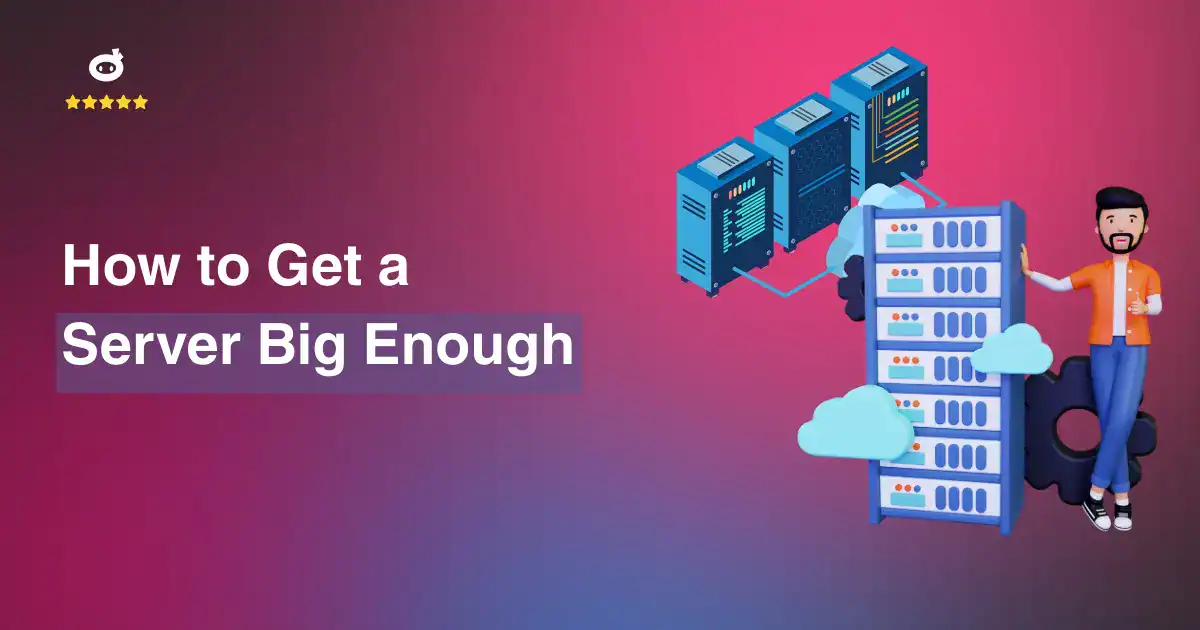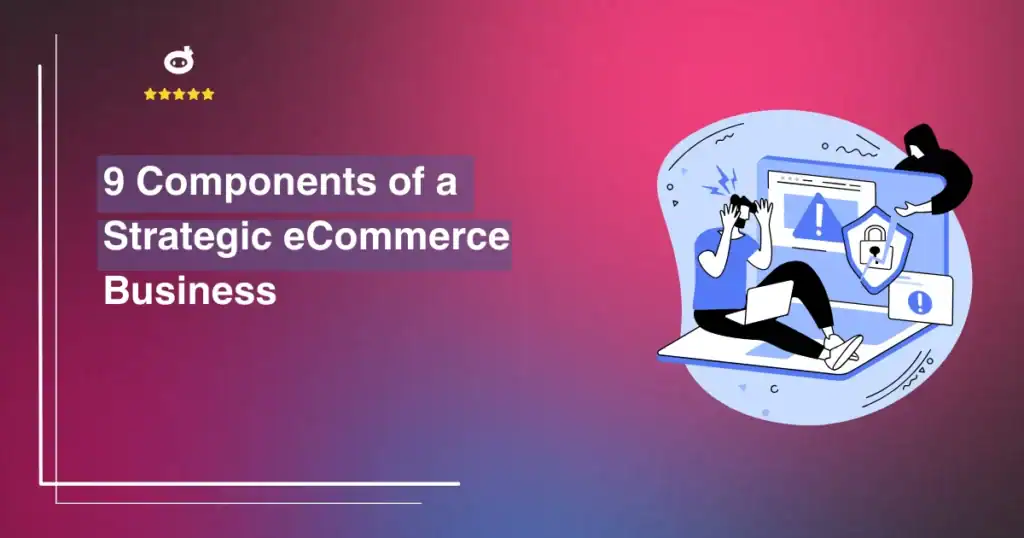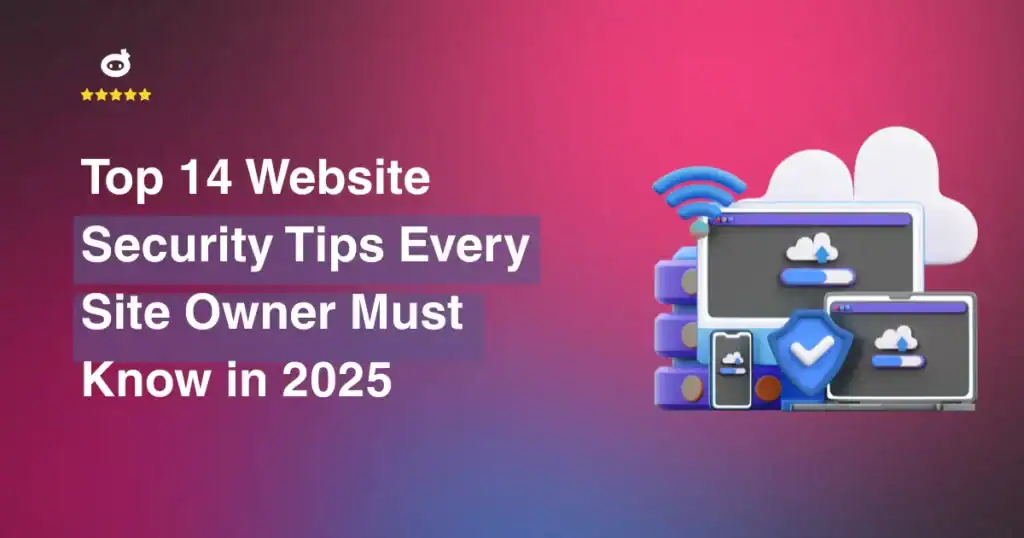Your website is the heart of your business, but if it’s slow, crashes often, or struggles with security issues, it could be a sign that your hosting is no longer enough. While shared hosting or a small VPS may have worked initially, growing traffic, increasing storage needs, and rising security threats demand more power and reliability. The question is, how do you know when it’s time to upgrade?
Ignoring the warning signs can be costly. Studies show that 40% of visitors abandon a site that takes more than three seconds to load, and downtime can cost businesses $5,600 per minute. Security risks on shared servers also put customer data in danger, while limited storage and customization options can restrict business growth. A struggling server doesn’t just affect performance, it impacts user experience, trust, and revenue.

So, when should you switch to a dedicated server? Here are five key signs:
✔ Slow website performance – Your site struggles with traffic or takes too long to load.
✔ Security vulnerabilities – Cyber threats and data breaches are a growing concern.
✔ Storage limitations – Your server lacks space for data, files, or applications.
✔ Customization restrictions – You need more control over software and configurations.
✔ Scalability issues – Your business is growing, but your server can’t keep up.
If these sound familiar, it’s time to consider upgrading. In the following sections, we’ll dive deeper into these signs and help you decide if a dedicated server is the right move for your business.
Contents
- 1 Dedicated vs. Non-Dedicated Servers: Which One Should You Choose?
- 1.1 1. Performance & Speed: Is Your Website Fast Enough?
- 1.2 2. Security & Data Protection: Can You Afford a Breach?
- 1.3 3. Customization & Control: Who’s in Charge?
- 1.4 4. Scalability & Business Growth: Can Your Server Keep Up?
- 1.5 5. Cost: What’s the Best Long-Term Investment?
- 1.6 6. SEO & Online Presence: Are You Visible?
- 2 5 Warning Signs It’s Time to Upgrade Your Server
- 3 Why Choose a Dedicated Server?
- 4 How to Upgrade & Choose the Right Dedicated Server
- 5 Key Factors to Consider When Upgrading
Dedicated vs. Non-Dedicated Servers: Which One Should You Choose?
Choosing the right server can be a game-changer for your business. Whether you’re running a high-traffic website, handling customer transactions, or prioritizing security, the decision between a dedicated server and a non-dedicated server (shared or VPS hosting) directly affects performance, security, and scalability. Understanding the differences is crucial before making an informed choice.
Dedicated Server provides an exclusive hosting environment where CPU, RAM, and bandwidth are reserved entirely for your business. You have full control over configurations, security protocols, and system resources, ensuring peak performance.
Non-Dedicated Server (Shared/VPS) means multiple users share the same resources, leading to potential slowdowns, security vulnerabilities, and scalability limitations. While shared hosting may be cost-effective for small websites, it lacks the reliability and performance needed for growing businesses.
1. Performance & Speed: Is Your Website Fast Enough?
Dedicated Server guarantees maximum performance by providing unrestricted access to processing power and bandwidth, allowing businesses to handle large databases, heavy traffic, and real-time transactions without performance drops. It eliminates bottlenecks, crashes, and slowdowns, even during peak hours.
A non-dedicated Server struggles to maintain consistent speed, especially when other websites on the server demand more power. Performance fluctuations, downtime, and slow load times are common, making it less suitable for mission-critical applications or high-traffic eCommerce stores.
2. Security & Data Protection: Can You Afford a Breach?
Dedicated Server offers advanced security features, including custom firewalls, DDoS protection, encryption, and intrusion detection systems. With complete control over security configurations, businesses can ensure regulatory compliance with PCI-DSS, HIPAA, and GDPR, which is crucial for industries like finance, healthcare, and eCommerce.
Non-Dedicated Server poses significant security risks. Since multiple websites share the same environment, a single security breach can impact all users. The inability to implement custom security measures increases vulnerability to cyberattacks, making dedicated hosting the safer option for businesses that cannot afford data breaches or downtime.
3. Customization & Control: Who’s in Charge?
Dedicated Server provides full root access, allowing businesses to install custom software, configure security settings, and optimize system performance based on their specific needs. This flexibility is essential for industries relying on AI, SaaS platforms, gaming servers, and data-heavy applications, where custom configurations and resource-intensive operations are required.
Non-Dedicated Server comes with limitations in customization. Users are restricted to pre-approved applications and settings controlled by the hosting provider. The inability to fine-tune security protocols or install specific software can be a major drawback for businesses requiring high-performance computing and specialized applications.
4. Scalability & Business Growth: Can Your Server Keep Up?
Dedicated Server allows seamless expansion, enabling businesses to increase CPU, RAM, and storage capacity as demand grows. Whether handling thousands of concurrent users, high-volume transactions, or global traffic surges, a dedicated server ensures uninterrupted operations.
Non-dedicated Server is not built for long-term growth. Resource limitations often force businesses to migrate servers, leading to downtime, traffic loss, and increased costs. If your business experiences frequent traffic spikes or seasonal surges, a dedicated server is the only way to guarantee stability and reliability.
5. Cost: What’s the Best Long-Term Investment?
Dedicated Server requires a higher initial investment but provides better uptime, security, and scalability, saving businesses from unexpected downtime costs that can reach $5,600 per minute. For businesses that rely on seamless performance and data security, the investment pays off in the long run.
Non-Dedicated Server is cheaper but come with hidden costs, including overage charges, migration fees, and performance slowdowns that impact revenue. As businesses grow, upgrading from shared hosting becomes inevitable, often making the switch to a dedicated server a necessity rather than a choice.
6. SEO & Online Presence: Are You Visible?
Dedicated Server enhances SEO rankings by improving site speed, uptime, and security, all of which contribute to better user experience and search visibility. Google prioritizes fast, secure, and reliable websites, giving dedicated hosting a significant advantage in ranking performance.
Non-dedicated servers can negatively affect SEO due to slow load times, frequent downtime, and potential security issues. Additionally, using a shared IP address increases the risk of being associated with spammy websites, which can harm your domain reputation.
5 Warning Signs It’s Time to Upgrade Your Server
Below are five critical signs that indicate your business needs a bigger, more powerful server to sustain its growth.
1. Declining Website Performance & Frequent Downtime
Why Performance Matters
Website speed and uptime are directly linked to user experience, engagement, and revenue. Research indicates that:
- 40% of users abandon a website if it takes longer than 3 seconds to load.
- A 1-second delay in page load time can result in a 7% drop in conversions.
- Google ranks fast websites higher, meaning slow servers hurt SEO and visibility.
If your website frequently lags, crashes under traffic spikes, or experiences prolonged loading times, your server is overburdened and lacks the resources needed to perform efficiently.
Indicators of Performance Issues:
- Slow load times, leading to high bounce rates and poor user experience.
- Frequent website downtime, resulting in lost traffic and potential sales.
- High Time to First Byte (TTFB), indicating server-side delays.
- Inability to handle concurrent users, causing crashes during high-traffic events.
These problems affect customer trust, brand reputation, and business revenue, making server performance a top priority.
2. Rising Security Threats & Data Vulnerabilities
The Growing Cybersecurity Risk
Cybersecurity threats are increasing at an alarming rate:
- Global cybercrime damages are projected to reach $10.5 trillion annually by 2025 (Cybersecurity Ventures).
- The average cost of a data breach is $4.45 million (IBM 2023).
- 75% of businesses worldwide have experienced a ransomware attack.
If your business is handling sensitive customer data, financial transactions, or confidential records, shared hosting exposes you to unnecessary security risks.
Signs Your Server Puts You at Risk:
- Frequent cyberattacks, malware infections, or unauthorized access attempts.
- Inability to comply with security regulations such as GDPR, HIPAA, or PCI-DSS.
- Shared server risks, a breach in another website on the same server compromises your data.
- DDoS attacks slow down your site, affecting customer experience and uptime.
A dedicated server ensures higher security by providing custom firewalls, advanced encryption, intrusion detection systems, and full control over security configurations.
3. Storage and Resource Limitations
The Need for More Storage & Resources
As your business scales, so do its data storage, database processing, and media file demands. A server with limited storage and computing power can severely impact efficiency and business operations.
Indicators Your Server is Running Out of Resources:
- Frequent “disk full” errors, limiting content uploads and preventing backups.
- Slow database queries, affecting real-time transactions and application speed.
- High CPU or RAM usage, leads to application crashes and system instability.
- Limited ability to store high-resolution images, videos, or large files.
If your storage needs are growing faster than your current hosting plan can accommodate, upgrading to a dedicated server provides scalable solutions, faster processing, and better reliability.
4. Lack of Customization and Software Control
Why Customization Matters
Certain businesses—especially e-commerce platforms, SaaS applications, gaming servers, and data-driven enterprises—require custom configurations to ensure peak performance and security.
However, shared hosting and VPS servers impose limitations on:
- Software installations—You may not be able to install specific applications required for business operations.
- Security settings—You are limited by the host’s security protocols, which may not meet compliance standards.
- Server optimization—Performance tuning is restricted because you don’t have full control over the system environment.
Signs Your Server Limits Customization:
- Inability to install necessary software (e.g., custom databases, analytics tools, or AI-driven applications).
- Restricted access to key system settings, preventing full optimization.
- Reliance on third-party hosting providers for security updates and patches.
A dedicated server removes these restrictions, giving businesses full root access, custom security configurations, and tailored server optimizations.
5. Increased Traffic and Business Growth
Scalability Challenges in Shared Hosting
Your business success should not be hindered by server limitations. If your website struggles to handle increasing visitors, your server is too small.
Key Statistics on Website Traffic Growth:
- A 100-millisecond delay in page response can cause a conversion rate drop of 7%.
- 70% of online businesses lose customers due to poor site speed and downtime.
- Downtime costs businesses an average of $5,600 per minute (Gartner).
Signs Your Server Can’t Handle Growth:
- Website crashes or slows down during peak sales periods (e.g., Black Friday, holiday shopping).
- Traffic spikes overwhelm your server, causing frequent timeouts.
- Limited ability to integrate new features like chatbots, video content, or AI-driven personalization.
If your current server is struggling to keep up, your business is losing potential revenue. A dedicated server ensures unlimited scalability, allowing for seamless expansion, faster response times, and a smooth user experience.
Why Choose a Dedicated Server?
In today’s digital landscape, businesses rely on speed, security, and scalability to stay competitive. A dedicated server provides exclusive access to resources, ensuring unparalleled performance, robust security, and complete customization, making it the ideal choice for businesses experiencing growth, high traffic, or demanding workloads.
Key Reasons to Choose a Dedicated Server :
1. Unmatched Performance & Speed
Website speed directly impacts user engagement and revenue. Studies show that:
- 40% of users abandon a site if it takes more than 3 seconds to load.
- A 1-second delay can reduce conversions by 7% and lower customer satisfaction.
- Google prioritizes fast websites, improving SEO rankings and visibility.
A dedicated server eliminates resource-sharing, ensuring high processing power, ample bandwidth, and fast response times for seamless user experiences.
2. Enterprise-Grade Security & Compliance
Cybercrime is on the rise, with global damages expected to hit $10.5 trillion annually by 2025 (Cybersecurity Ventures). Shared hosting environments expose businesses to data breaches and malware attacks.
A dedicated server offers:
- Custom firewalls and encryption to safeguard sensitive data.
- Intrusion detection systems (IDS) for proactive threat mitigation.
- Regulatory compliance (GDPR, PCI-DSS, HIPAA) for industries handling confidential information.
3. Full Control & Customization
Unlike shared hosting, a dedicated server gives businesses full root access, allowing customization of:
- Software installations tailored to business needs.
- Security protocols for enhanced data protection.
- Performance optimizations to maximize server efficiency.
4. Scalability & Future-Proofing
Growing businesses require scalable infrastructure to accommodate increasing traffic and data demands. A dedicated server:
- Prevents slowdowns during high-traffic periods.
- Allows on-demand upgrades for RAM, CPU, and storage.
- Supports advanced technologies like AI, big data, and cloud applications.
How to Upgrade & Choose the Right Dedicated Server
A dedicated server ensures speed, security, and scalability, offering exclusive resources and full control. For businesses handling high traffic, data security, and seamless user experiences, it’s a must-have for reliability and growth.
Upgrading to a dedicated server is a strategic move. However, selecting the right server requires careful evaluation of your business needs, workload requirements, and long-term growth strategy.
Key Factors to Consider When Upgrading
Upgrading to a dedicated server is a critical decision that impacts performance, security, scalability, and business continuity. Choosing the right server requires careful evaluation of your business needs and future growth.
Here are the key factors to consider before making the switch.
1. Assess Your Performance & Resource Needs
A high-performing server ensures fast load times, seamless multitasking, and efficient processing power. Selecting the right combination of CPU, RAM, and storage is essential.
- Processing Power – Choose a CPU based on workload intensity. Intel Xeon and AMD EPYC processors offer high-performance computing for demanding applications like AI, big data, and virtualization.
- RAM Requirements – Higher RAM (32GB+) allows for smoother multitasking, better caching, and enhanced speed for high-traffic websites.
- Storage Type – NVMe SSDs provide faster data access, reducing website lag, while RAID configurations offer redundancy to prevent data loss.
2. Evaluate Bandwidth & Traffic Handling
- Bandwidth Allocation – Businesses with high traffic, media streaming, or eCommerce operations need unmetered bandwidth to prevent slowdowns during peak times.
- Load Balancing – Ensures even distribution of traffic across multiple resources, preventing crashes during traffic surges.
3. Security & Compliance Considerations
With cybercrime threats increasing, dedicated servers must offer enterprise-level security to protect sensitive data.
- Advanced Security Features – Look for custom firewalls, DDoS protection, and SSL encryption to prevent attacks.
- Regulatory Compliance – Industries like finance, healthcare, and eCommerce should choose servers compliant with PCI-DSS, HIPAA, and GDPR to avoid legal risks and data breaches.
4. Managed vs. Unmanaged Hosting
- Managed Servers – Ideal for businesses needing automatic updates, expert maintenance, 24/7 technical support, and security management without requiring in-house expertise.
- Unmanaged Servers – Suitable for companies with dedicated IT teams that can handle manual configurations, software installations, and security patches.
Upgrading to a dedicated server is a long-term investment in performance, security, and scalability. By considering these factors, businesses can choose a future-proof hosting solution that supports growth, efficiency, and seamless user experience.
Conclusion
A dedicated server isn’t just an upgrade, it’s a necessity for businesses aiming for speed, security, and scalability. If your website suffers from slow load times, security vulnerabilities, storage limitations, or struggles with high traffic, shared hosting is holding you back. A dedicated server eliminates these bottlenecks, ensuring a seamless, high-performance experience for your users.
With 40% of visitors abandoning slow websites, speed is critical for engagement and conversions. A dedicated server provides exclusive resources, reducing downtime and boosting site performance. Security is equally important, shared hosting exposes your business to cyber threats, while a dedicated server protects your data with firewalls, encryption, and intrusion detection.
As your business grows, so does your need for scalable storage and customization. A dedicated server adapts to your requirements, allowing custom configurations, software installations, and optimized security settings.
Investing in a dedicated server isn’t just a short-term fix, it’s a long-term strategy for stability, security, and business growth. Don’t let hosting limitations slow you down or put your data at risk. Upgrade today and ensure your business is ready for the future!
Written by Lars Koudal








